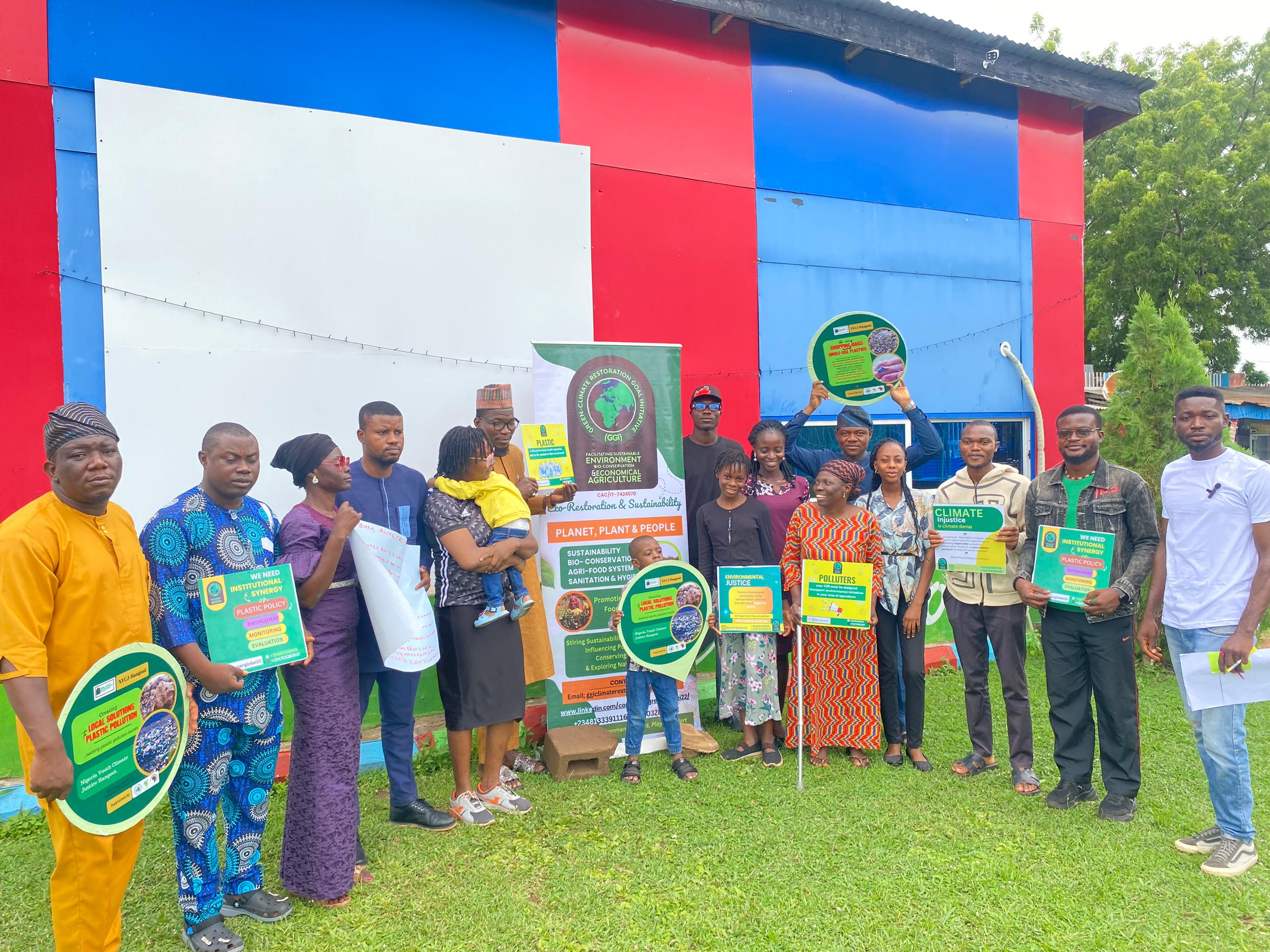By Toheeb Omotayo
In the heart of Ilorin, the Kwara State capital, a small but powerful event and brainstorming session was hosted over the weekend as young Nigerian environmentalists, think tanks, community leaders, civil society actors and goal achievers gathered for the Nigeria Youth Climate Justice Hangout 2025, under the rallying theme “Beat Plastic Pollution Locally.”
The hangout was organized by Green-Climate Restoration Goal Initiative (GGI) in partnership with International Climate Change Development Initiative (ICCDI) with support from Africa Activists for Climate Justice (AACJ) and the African Youth in Action Commission.
The event marked a turning point in the conversation around climate justice as Nigeria celebrated world environment day 2025.
From Kwara to Africa: Localizing Climate Solutions and Environmental Justice.
While Kwara served as the focal point for this event, the issues discussed reflect a broader crisis gripping communities across Nigeria and the African continent. From Lagos to Lilongwe, and from Port Harcourt to Pretoria, plastic pollution is choking waterways, clogging drainage systems, threatening biodiversity, and disproportionately affecting low-income and underserved populations.
Africa produces over 17 million tonnes of plastic waste annually, much of which ends up in unregulated landfills or the natural environment. In Nigeria alone, only 12% of plastic waste is recycled, according to the United Nations Environment Programme (UNEP). With this alarming trend, localized interventions like those launched in Kwara become crucial parts of a continental solution.
Community Dialogue, Empowerment, and Innovation in Ilorin
The hangout, held on Saturday, June 14, 2025, at Family Fun City Park, Ilorin, brought together 20 participants including youth leaders, persons with disabilities (PWD), children, and civil society representatives. The discussions focused on practical, community-based strategies to curb plastic waste.
Key sessions included an interactive panel on plastic alternatives and single-use plastic reduction, a community mapping exercise to identify waste hotspots in Kwara State, and a Story Circle, where participants shared emotional experiences of how plastic waste has impacted health, agriculture, and livelihoods in their individual communities.
While talking at the event, Akintola Akinyemi, a seasoned environment activist and the host emphasized that environmental burden is most felt in grassroots areas—where weak infrastructure, poor policy enforcement, and limited awareness converge to create systemic pollution, hence, he set the trajectory of the conversations on LOCALIZED SOLUTIONS AND ACTION STEPS. Participants raised a reminder that climate justice cannot be achieved without social equity.
From Conversations to Commitments
The outcome of the event went far beyond awareness. A team of 15 community ambassadors was inaugurated to lead local campaigns and implement solutions. A pilot plastic drive and recycling project was conceived for rollout in a community per time, with plans to replicate it across multiple LGAs in Kwara State.
Communication, coordination and monitoring channels was created for sustained momentum, and to integrate local vendors and other relevant stakeholders who will not only pledge to phase out single-use plastics in favor of eco-friendly packaging, but that will also advance actions for results.
The event also concluded with far-reaching policy recommendations, including: Enforcing quality standards among plastic bag manufacturers, public sensitization about the risks of low-grade plastic products, and enforcement of Extended Producer Responsibility (EPR) on manufacturers and other businesses.
Others are; Supporting entrepreneurs in the plastic value chain with incentives, instead of just taxations, Implementation of strict penalties at the local government level for indiscriminate waste dumping, and promotion of plastic-neutral events, shopping, and daily habits among citizens.
A Call for Continental Collaboration
What happened in Ilorin on Saturday is part of a growing grassroots wave sweeping across Africa—an urgent call for environmental accountability, youth-led innovation, and inclusive climate actions.
As African nations prepare for COP30 and other global summits, the focus must shift toward localized climate solutions that empower communities on the frontlines. Plastic pollution is not just a waste issue—it is a justice issue, a health issue, and a development issue.
The Nigeria Climate Justice hangout event proved that small, community-led actions can ripple outward to inspire broader policy, behavior, and systems change.
A Message to Governments, Stakeholders, and Citizens
As the effects of climate change intensifies, the time for tokenistic responses is over. Youth across Nigeria and Africa are demanding more than empty promises. They are organizing, educating, and mobilizing—not just for themselves but for future generations.
Governments must respond with bold policies and investments that prioritize waste regulation, innovation, and environmental justice. Manufacturers must take full responsibility for their plastic footprints. Citizens must embrace sustainable lifestyles, understanding that every plastic bag avoided, every bottle recycled, is a step toward climate resilience.
The message from Ilorin is clear: Beating plastic pollution starts locally—but its impact can reshape the continent.
Finally, the host, Akintola Akinyemi lauds the support from ICCDI Africa, AACJ and partners, and also call for more innovative collaborations among other development partners to sustainably drive more impactful projects in Nigeria.
As always we say; In Climate and Environment Matters, Play Your Parts…
Toheeb Omotayo is a Nigerian-based Developmental Journalist. He writes on governance, technology, education, health and climate.

